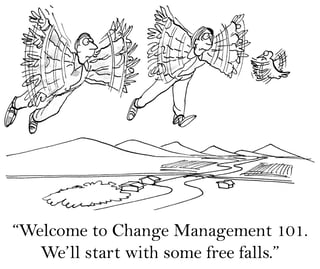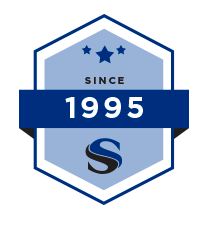How Even Good Change Can Hurt Your Long-term Success
The fourth article in our series on Project Management Risk Factors
In the first three articles of this series, we described internal problems that often lead to project failure, problems that can undo a program manager's best efforts to deliver quality projects.
Do you feel like you get punished for doing a good job? If so, this article is for you.
We're not going to look at technical, environmental, or internal problems that lead to project failure, but issues that often arise from a program manager's success. In other words, when a project succeeds, the program manager can sometimes become a victim of that success.
 Peter: I don’t like my job. Don’t think I’ll go anymore.
Peter: I don’t like my job. Don’t think I’ll go anymore.
Joanna: You’re just not gonna go?
Peter: Yeah.
Joanna: Won’t you get fired?
Peter: I don’t know. But I really don’t like it and, uh, I’m not gonna go.
Joanna: So you’re gonna quit?
Peter: No, not really. I’m just gonna stop going.
Joanna: When did you decide all that?
Peter: About an hour ago.
Successful Projects Bring Challenges
All too often, we've seen a project start very agile, with a lot of ongoing discovery and collaborative solutioning alongside the customer.
This agile, collaborative, solution-focused approach leads to success, and not only success but project expansion. In this mode of project delivery, customers say this to us, “Hey, this project has been so valuable here, why don't we apply it in a new context over here, or expand it to serve these other needs here?” Often the role of the program manager expands along with the project.
Want to see more success in your projects? Grab this - The Ultimate Program Manager's Toolkit:
Perhaps the program manager started as a technical lead, working alongside the delivery team to fulfill the contract. Now due to success and promotion, the program manager has several programs to manage, and can no longer focus on leveraging the technical skillset that put him/her into the original position in the first place. Instead, he or she must focus on other things – the big strategy of several projects, improving operations, efficiency, and managing many team members. The program manager went from a very intimate, creative, and solution-oriented role, to a strategic, operational, management-oriented role.
All too often, the more a program manager succeeds, the less he or she can use experience and skills to solve problems, and the more he or she must act as a cog in the wheel of expansion. The program manager gets spread thin (trying to complete new tasks outside his or her areas of strength) and gets discouraged because success in the new role is less fulfilling. He/she wasn't dreaming of making operations an incredibly efficient machine, enabling the company to healthily expand; instead he or she had dreamed of solving real problems alongside their customer.
In this situation we aren't talking about project failure, but personal failure for the program manager. In either case, the reason this article exists is to help program managers recognize when their role is shifting and how to make changes to remain in the place they perform best and most enjoy.
Though we're talking about personal failure in this case, sometimes when a program manager's role changes along with the forces of necessity, it can have a negative impact on the company as well. What if your business development manager successfully leads the company in growth, but due to a lack of reflection and the necessity of getting business done, ends up in a program manager role instead?
We've got a tale from our archive to illustrate how this situation can absolutely bring about big picture failure.
One of our senior managers was hired at a previous company to lead their company expansion and take them to the “next level” from small business to large business. In less than a year after joining, that manager had helped bring in an extra $15 million to the company. And due to a lack of planning, reflection, and this success, the company asked him to help manage all the new programs. By the time the manager left the firm, he was managing 60+ projects in  over 22 programs, and not helping the company bring in new projects and reach the “n ext level” at all. Even after all the success, the company was still a small business and the manager was not doing what he wanted nor had been hired to do.
over 22 programs, and not helping the company bring in new projects and reach the “n ext level” at all. Even after all the success, the company was still a small business and the manager was not doing what he wanted nor had been hired to do.
Here's a simple thought: senior management needs to know its people well (especially its managers), ensuring that each person is working in their strengths. “Keep your growth people growing and your operations people operating.”
The Easiest Method To Discover Role Incongruity
Here's the question to ask yourself as you consider whether you are facing Role Incongruity:
Are you choosing your bus seat, or is your seat being assigned? After all the change & growth in your projects, are you still in the right seat?
The opportunity for senior management to keep a finger on the pulse of this congruity/incongruity is during performance reviews. These times are not merely a chance for senior management to provide feedback to you, but more importantly to ensure you are continuing in your trajectory toward career goals (especially when you are working on programs that are experiencing a lot of change).
If a program is expanding and a technical program lead is being forced to manage more operationally, then look to move that person back to doing what he or she does best, and to bring in a person with an Ops skill set to take over the program manager role.
The perspective to take on performance reviews is therefore to not merely help the associate improve and grow, but for senior management to help them take a step back and stay on track for “big picture” career progress.
If senior management discovers that a person’s role has shifted and misaligned due to changes in a project or overall company changes and that program manager is no longer working in an area of strength, what should they do?
6 Ways to Avoid or Fix Role Incongruity
- Manage your own career path: periodically assess your professional needs and aspirations and map those to the bigger corporate picture.
- Similar to your aspirations, what are your strengths? Do your strengths play well into your company's success and potential future roles?
- Senior managements' job is more than simply knowing their team's individual skills and leveraging them to the best of their ability, but do they know your personal goals, and do they want your input on your career trajectory?
- Program managers who perform should receive the recognition and reward that they've earned. If they are working hard toward achievement but not reaching it, it could be that they are in the wrong role.
- Furthermore, company culture should stress open communication between senior management and program managers, so that these issues can be quickly and handled appropriately
- Just as senior management should maintain a culture of open communication, the company should also have a developed policy in place for you to bring issues up the organization tree, to enable you and your own team to “fight for feedback.”
What about you?
Where do you find yourself currently?
Are you operating in your strengths, in a role that takes advantage of your skills and experience?
Or are you currently experiencing role incongruity?
Do you find yourself at a stage where your career trajectory has flattened out, and you're struggling to get the kind of results you could in a different role?
Are there any roles even available that you want?
We put together a Program Health & Risk Assessment Questionnaire that will help you answer this very question. When completed, you will receive a unique Program Health Score, with specific feedback to help you:
- Get perspective on how well your current role enables you to utilize your strengths
- See how closely your approach in project fulfillment matches that of your company
- See how well your company helps its employees reach their fullest potential
This review template will be the perfect tool to discuss with senior management and turn your quarterly performance reviews into an opportunity for you to gain new support in your career growth. It's an ideal way to show senior management how important it is to you to get the best results that you can from your own work, and how well your strengths match the responsibilities you have been given.



